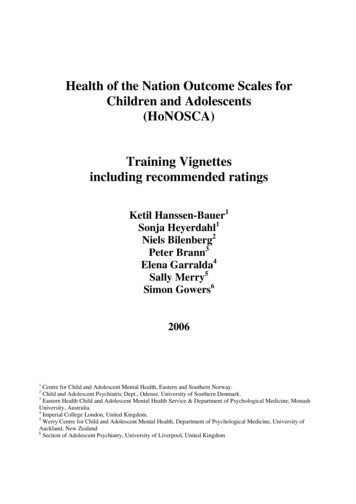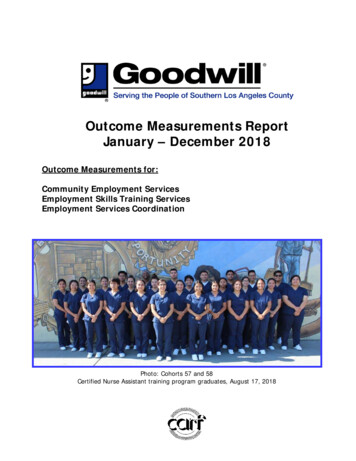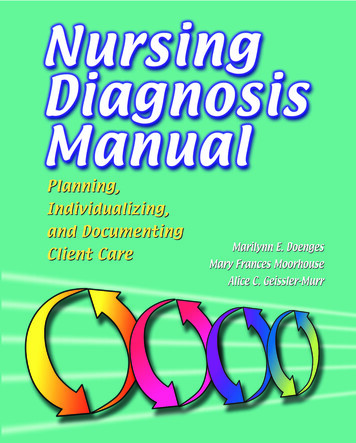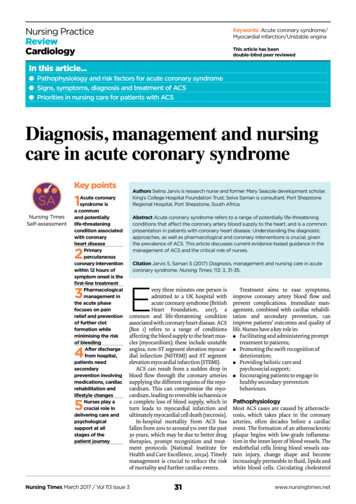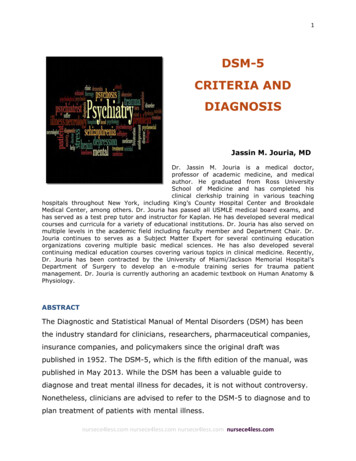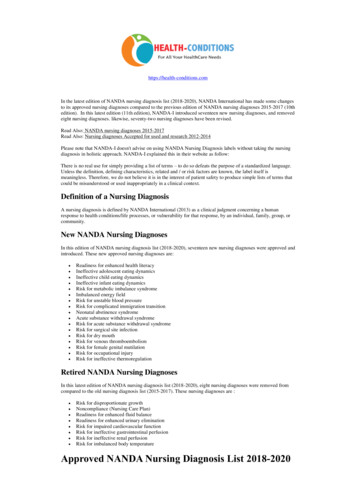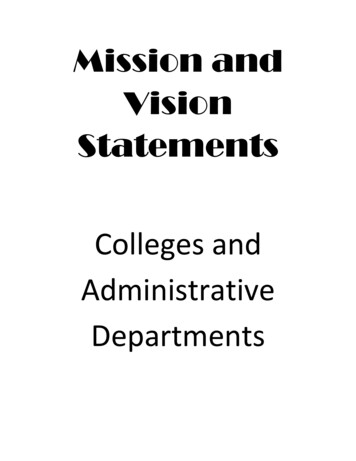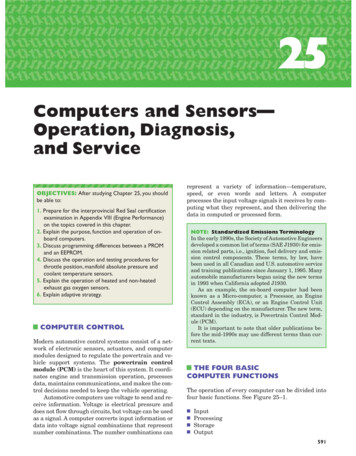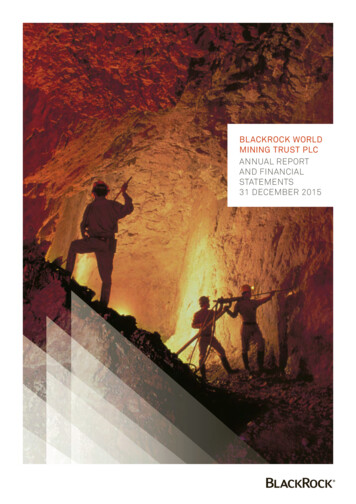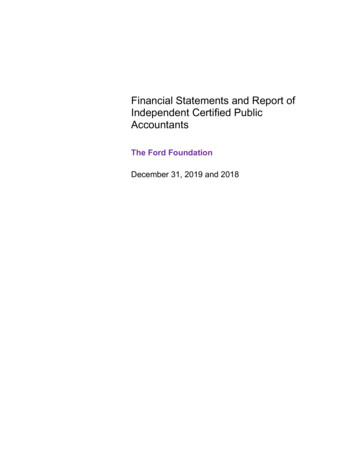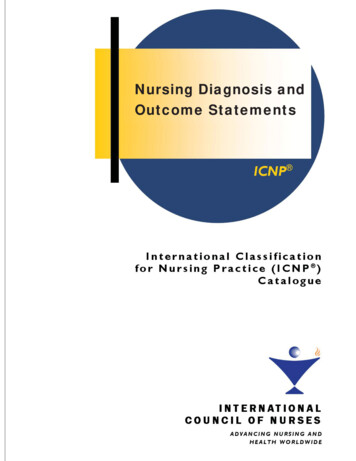
Transcription
Nursing Diagnosis andOutcome Statements
All rights, including translation into other languages, reserved. No part of thispublication may be reproduced in print, by photostatic means or in any othermanner, or stored in a retrieval system, or transmitted in any form, or soldwithout the express written permission of the International Council of Nurses.Short excerpts (under 300 words) may be reproduced without authorization, oncondition that the source is indicated.Copyright 2019 by ICN – International Council of Nurses,3, place Jean-Marteau, 1201 Geneva, Switzerland
Title: Nursing Diagnosis and Outcome StatementsCatalogue Type: Terminology SubsetPublication Date: 2008, Updated 2011, 2013, 2015, 2017, 2019Authors: Creation of this catalogue was a group endeavour.Note: This catalogue provides ICNP concepts to support nurses in assessing, diagnosing, andevaluating outcomes across the continuum of care.Background: The International Classification for Nursing Practice (ICNP ) is a unified nursinglanguage system that supports the standardisation of nursing documentation at the point ofcare. The resulting data-based information can be used for planning and managing nursingcare, financial forecasting, analysis of patient outcomes and policy development. The ICNPStrategic Advisory Group and many other expert nurses involved with ICNP have recognisedthat manageable subsets of the terminology should be available to nurses working with patientsor clients in selected specialties and settings.The purpose of a catalogue is to make ICNP a useful tool for nurses at the point of care.Catalogues are subsets of ICNP that allow nurses to more readily integrate ICNP into theirpractice as they work in a specialty area or with clients having specific health conditions orneeds.Catalogues do not replace the clinical judgement of the nurse. Nurses can use Catalogues asreference tools for documenting care and reflecting on their practice. Nurses’ clinical judgementand decision-making are essential for individualised care of patients and their families andcannot be replaced by any tool.References:International Council of Nurses (2001). International Classification for Nursing Practice Beta 2Version. Geneva, Switzerland: International Council of Nurses.International Council of Nurses (2005). International Classification for Nursing Practice Version1.0. Geneva, Switzerland: International Council of Nurses.International Council of Nurses (2009). International Classification for Nursing Practice Version2. Geneva, Switzerland: International Council of Nurses.Copyright 2019 by ICN – International Council of Nurses,3, place Jean-Marteau, 1201 Geneva, Switzerlandpage 3
3545556575859Nursing Diagnosis and Outcome Statement (Code)Negative Diagnosis And Outcome (10016467)Activity Intolerance (10000431)Acute Health Crisis (10029684)Adverse Medication Interaction (10042728)Agitation (10025705)Reduced Agitation (10027843)Alcohol Dependence (10041347)Altered Blood Pressure (10022954)Altered Uterine Contractions (10045675)Altered Vital Sign (10050516)Arterial Ulcer (10029700)Autonomic Dysreflexia (10000496)Behaviour Problem (10029716)Aggressive Behaviour (10047087)Violent Behaviour (10035480)Child Abandonment (10037806)Compulsive Behaviour (10047189)Difficulty Performing Breastfeeding (10001098)Interrupted Breastfeeding (10000774)Disorganised Infant Behaviour (10000653)Impaired Caregiver Child Attachment (10027219)Impaired Exercise Behaviour (10022043)Impaired Health Seeking Behaviour (10022920)Impaired Infant Feeding Behaviour (10001196)Inappropriate Self Disclosure (10041663)Lack Of Play Activity (10040783)Problematic Sexual Behaviour (10001274)Self Destructive Behaviour (10027424)Self Mutilation (10001623)Substance Abuse (10022268)Alcohol Abuse (10022234)Drug Abuse (10022425)Tobacco Abuse (10022247)Withdrawn Behaviour (10040765)Decreased Withdrawn Behaviour (10047459)Body Weight Problem (10027290)Overweight (10027300)Underweight (10027316)Emaciated (10047162)Breast Engorgement (10029728)Burn Wound (10029737)Chapped Lip (10050619)Communication Barrier (10022332)Complex Medication Regime (10022983)Polypharmacy (10030042)Confined To Bed (10050456)Conflicting Attitude Toward Care (10022281)Conflicting Attitude Toward Medication Management (10022299)Conflicting Attitude Toward Treatment (10023622)Conflicting Attitude Toward Dietary Regime (10024969)Conflicting Attitude Toward Exercise (10023614)Conflicting Caregiver Attitude (10025629)Conflicting Cultural Belief (10022397)Conflicting Health Belief (10022516)Conflicting Religious Belief (10021757)Conflicting Spiritual Belief (10022769)Contamination Exposure (10025297)Continuity Of Care Problem (10029759)Crime (10022384)Copyright 2019 by ICN – International Council of Nurses,3, place Jean-Marteau, 1201 Geneva, Switzerlandpage 4
05106107108109110111112113114115116117118Nursing Diagnosis and Outcome Statement (Code)Decreased Intracranial Adaptive Capacity (10000828)Delayed Growth (10034926)Delayed Physical Recovery (10037749)Delayed Surgical Recovery (10037426)Delusion (10047002)Diabetic Ulcer (10042181)Difficulty Coping (10001120)Denial (10000624)Denial About Illness Severity (10043850)Difficulty Coping With Pain (10040731)Impaired Acceptance Of Health Status (10029480)Impaired Adaptation (10022027)Impaired Community Coping (10034817)Impaired Family Coping (10034789)Discomfort (10023066)Disorientation (10001235)Improved Orientation (10028586)Disrupted Energy Field (10001149)Disuse Response (10025209)Disuse Syndrome (10023097)Drug Dependence (10041381)Dry Skin (10047073)Earwax Problem (10029818)Effective Recovery from Abuse (10035479)Effective Recovery from Sexual Assault (10045787)Emotional Problem (10029839)Ambivalence (10047209)Anger (10045578)Anxiety (10000477)Death Anxiety (10041017)Reduced Anxiety (10027858)Depressed Mood (10022402)Decreased Depressed Mood (10027901)Depressed Mood During Post Partum Period (10029771)Despair (10047056)Decreased Despair (10047444)Dysfunctional Grief (10001183)Anticipatory Grief (10000726)Fatigue (10000695)Reduced Fatigue (10029390)Treatment Exhaustion (10022833)Fear (10000703)Fear About Abandonment (10037823)Fear About Being A Burden To Others (10041671)Fear About Contagion (10037921)Fear About Death (10037834)Fear About Medication Side Effects (10043222)Reduced Fear (10027889)Helplessness (10039952)Hopelessness (10000742)Lack Of Pride (10025693)Lack Of Trust (10025947)Lack Of Trust In Health Care Provider (10025952)Negative Euphoria (10047400)Powerlessness (10001578)Decreased Powerlessness (10027120)Sadness (10040662)Chronic Sadness (10000551)Reduced Chronic Sadness (10027862)Copyright 2019 by ICN – International Council of Nurses,3, place Jean-Marteau, 1201 Geneva, Switzerlandpage 5
7168169170171172173174175176177Nursing Diagnosis and Outcome Statement (Code)Shame (10046761)Spiritual Distress (10001652)Decreased Spiritual Distress (10027149)Suffering (10025588)Employment Problem (10029841)Environmental Problem (10023959)Environmental Safety Problem (10029856)Excess Vaginal Discharge (10043331)Fall (10029405)Financial Problem (10029860)Inadequate Income (10022563)Haemorrhoid (10043279)Health Care Associated Complication (10041283)Homebound (10029887)Housing Problem (10029904)Immunologic Impairment (10041103)Allergy (10029697)Food Allergy (10047158)Latex Allergy (10000790)Impaired Ability to Manage Finances (10034552)Impaired Ability To Manage Regime (10000885)Impaired Ability To Manage Dietary Regime (10022592)Impaired Ability To Manage Exercise Regime (10022603)Impaired Ability To Manage External Continence Device (10042548)Impaired Ability To Manage Medication Regime (10022635)Impaired Ability To Manage Peritoneal Dialysis (10029582)Impaired Ability To Manage Stoma Care (10029595)Impaired Ability To Manage Nephrostomy Care (10029576)Impaired Ability To Manage Urinary Catheter (10029609)Impaired Community Ability To Manage Regime (10000892)Impaired Family Ability To Manage Regime (10000902)Impaired Ability To Monitor Disease (10029613)Impaired Ability To Participate In Care Planning (10035134)Self Care Deficit (10023410)Impaired Ability To Perform Hygiene (10000987)Impaired Ability To Bath (10000956)Impaired Ability To Dress (10027578)Impaired Dressing And Grooming (10000960)Impaired Ability To Groom (10029632)Impaired Dressing And Grooming (10000960)Impaired Ability To Perform Oral Hygiene (10029645)Impaired Self Toileting (10000994)Improved Ability To Toilet Self (10047266)Impaired Ability To Transfer (10001005)Impaired Self Feeding (10000973)Impaired Ability To Perform Caretaking (10029621)Impaired Ability Of Caregiver To Perform Caretaking (10035414)Impaired Parenting (10000939)Impaired Ability To Perform Leisure Activity (10040351)Impaired Ability To Prepare Food (10029650)Impaired Ability To Shop (10034581)Impaired Active Range Of Motion (10052095)Impaired Adjustment (10000863)Impaired Alertness (10027165)Impaired Attitude To Nutritional Status (10025492)Impaired Balance (10047170)Improved Balance (10047348)Impaired Cardiovascular System (10022949)Impaired Circulatory System Function (10047136)Copyright 2019 by ICN – International Council of Nurses,3, place Jean-Marteau, 1201 Geneva, Switzerlandpage 6
6227228229230231232233234235236Nursing Diagnosis and Outcome Statement (Code)Epistaxis (10046735)Impaired Cardiac Function (10037305)Bradycardia (10027274)Tachycardia (10027288)Impaired Peripheral Neurovascular Function (10023153)Ineffective Tissue Perfusion (10001344)Impaired Peripheral Tissue Perfusion (10044239)Vaginal Bleeding (10043930)Impaired Cognition (10022321)Decisional Conflict (10000579)Moral Distress (10025018)Reduced Decisional Conflict (10027804)Distorted Thinking Process (10000669)Confusion (10023633)Acute Confusion (10000449)Chronic Confusion (10000522)Decreased Confusion (10027098)Delirium (10022091)Reduced Distortion In Thinking (10035621)Decreased Confusion (10027098)Expressive Aphasia (10047018)Dysphasia (10029802)Impaired Abstract Thinking (10047191)Impaired Concentration (10051517)Impaired Attention (10051501)Impressive Aphasia (10047025)Improved Cognition (10051540)Reduced Decisional Conflict (10027804)Reduced Distortion In Thinking (10035621)Decreased Confusion (10027098)Lack Of Self Awareness (10029451)Lack Of Awareness Of Symptoms (10029479)Suicidal Ideation (10022795)Impaired Communication (10023370)Impaired Verbal Communication (10025104)Impaired Dentition (10001131)Improved Dentition (10047232)Impaired Family Process (10023078)Conflicting Family Attitude (10022456)Impaired Family Coping (10034789)Dysfunctional Family Process With Alcohol Abuse (10001165)Interrupted Family Process (10000788)Impaired Gastrointestinal System Function (10022931)Constipation (10000567)Faecal Impaction (10021885)Dyspepsia (10047094)Heartburn (10043298)Impaired Defaecation (10022062)Diarrhoea (10000630)Vomiting (10025981)Hyperemesis (10046757)Impaired Health Maintenance (10000918)Impaired Homemaking (10000925)Impaired Human Development (10023260)Impaired Adolescent Development (10023304)Impaired Adult Development (10023315)Impaired Older Adult Development (10023327)Impaired Child Development (10023294)Impaired Foetal Development (10045597)Copyright 2019 by ICN – International Council of Nurses,3, place Jean-Marteau, 1201 Geneva, Switzerlandpage 7
5286287288289290291292293294295Nursing Diagnosis and Outcome Statement (Code)Impaired Infant Development (10023287)Impaired Newborn Development (10023273)Impaired Interactive Behaviour (10027430)Impaired Memory (10001203)Impaired Mobility (10001219)Impaired Mobility in Bed (10001067)Impaired Walking (10001046)Impaired Wheelchair Mobility (10001363)Impaired Musculoskeletal System Function (10022642)Paralysis (10022674)Seizure (10045668)Tremor (10022846)Impaired Nervous System Function (10037322)Altered Perception (10001242)Dizziness (10045584)Hallucination (10022500)Impaired Kinaesthesia (10034886)Improved Perception (10047437)Decreased Unilateral Neglect (10033525)Reduced Pain (10027917)Nausea (10000859)Nightmare (10039968)Pain (10023130)Abdominal Pain (10043953)Acute Pain (10000454)Allodynia (10039934)Arthritis Pain (10047104)Breast Tenderness (10046676)Chronic Pain (10000546)Cutaneous Pain (10047115)Fracture Pain (10047127)Hyperalgesia (10039923)Increased Pain (10051555)Leg Cramps (10046719)Phantom Pain (10039906)Reduced Pain (10027917)Suspicion (10022805)Thirst (10037847)Unilateral Neglect (10033573)Decreased Unilateral Neglect (10033525)Apraxia (10047041)Impaired Psychomotor Activity (10025087)Impaired Nutritional Status (10025746)Impaired Nutritional Intake (10023009)Impaired Fluid Intake (10029873)Improved Fluid Intake (10047330)Impaired High Nutritional Intake (10025535)Excess Food Intake (10000682)Impaired Low Nutritional Intake (10025519)Deficient Food Intake (10000607)Improved Food Intake (10047324)Improved Nutritional Status (10035569)Improved Food Intake (10047324)Impaired Physiological Status (10030035)Bowel Incontinence (10027718)Failure To Thrive (10022898)Adult Failure To Thrive (10000465)Impaired Cardiac Output (10025557)Impaired Oral Status (10051419)Copyright 2019 by ICN – International Council of Nurses,3, place Jean-Marteau, 1201 Geneva, Switzerlandpage 8
11312313314315316317318319320
Title: Nursing Diagnosis and Outcome Statements Catalogue Type: Terminology Subset Publication Date: 2008, Updated 2011, 2013, 2015, 2017, 2019 Authors: Creation of this catalogue was a group endeavour. Note: This catalogue provides ICNP concepts to support nurses in assessing, diagnosing, and evaluating outcomes across the continuum of care. .
